| Listing 1 - 10 of 10 |
Sort by
|
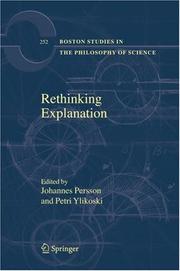
ISBN: 9781402055812 1402055803 9781402055805 1402055811 1280865156 9786610865154 9400787081 Year: 2007 Volume: 252 Publisher: Dordrecht Springer
Abstract | Keywords | Export | Availability | Bookmark
 Loading...
Loading...Choose an application
- Reference Manager
- EndNote
- RefWorks (Direct export to RefWorks)
The nature of scientific explanation has been an important topic in philosophy of science for many years. This book highlights some of the conceptual problems that still need to be solved and points out a number of fresh philosophical ideas to explore. Anyone interested in causal and probabilistic explanation, explanation-seeking questions and contrastive explanations, inference to the best explanation, or explanations within the special sciences should find something of interest in this book.
epistomologie --- epistemologists --- Philosophy of science --- Theory of knowledge --- kennisleer --- Pure sciences. Natural sciences (general) --- Explanation. --- Science --- Philosophy. --- Normal science --- Explanation (Philosophy) --- Knowledge, Theory of --- Verklaring. --- Genetic epistemology. --- Philosophy of Science. --- Epistemology. --- Developmental psychology --- Philosophy and science. --- Epistemology --- Philosophy --- Psychology --- Science and philosophy --- Explanation
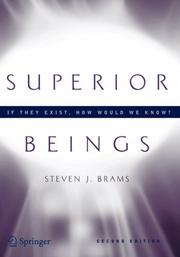
ISBN: 1280969741 9786610969746 0387480773 9780387480657 038748065X 9780387480770 Year: 2007 Publisher: New York : Springer,
Abstract | Keywords | Export | Availability | Bookmark
 Loading...
Loading...Choose an application
- Reference Manager
- EndNote
- RefWorks (Direct export to RefWorks)
The central question posed in this book is: If there existed a superior being who possessed the supernatural qualities of omniscience, omnipotence, immortality, and incomprehensibility, how would he/she act differently from us? The mathematical theory of games is used to define each of these qualities, and different assumptions about the rules of play in several theological games that might be played between ordinary human beings and superior beings like God are posited. Implications of these definitions and assumptions are developed and used to explore such questions as: are God's superior powers compatible with human free will? Can they be reconciled with the problem of evil in the world? In what situation is God's existence "decidable" in gamelike relationships He migh have with us? By endowing omniscience/omnipotence/immortality/incomprehensibility with unambiguous meanings, the author shows how game theory can help breathe life into questions that have been dismissed too quickly simply because they are metaphysical--outside the world of experience. Thereby he clarifies the structure of our thought about an ultimate reality, whether or not it is viewed as religious. Reviews from the first edition: "[Brams's] arguments, some of them quite complicated, are presented clearly and enough background information is given to enable the non-expert in game theory to follow what is going on." - H.N.V. Temperley, Nature (March, 1984) "Superior Beings is an extraordinary book... He [Brams] uses strikingly simple models and generally transparent logic to make some surprising inferences about superiority. His inquiry is carried out with great inventiveness and care, and his book is highly recommended to those interested in religion, philosophy, and the contribution of logical analysis." - D. Marc Kilgur, American Scientist (1984) "Brams has performed a service in deominstrating that rational analysis need not stop where issues involving faith and emotion begin." - Peter Bennett, New Scientist (1 March, 1984) "Does game-theoretic theory exist? This book is a fresh partial answer, modestly phrased and interestingly written. Readers will enjoy it and learn from it whether or not the believe in either God or von Neumann." - Dr. Paul R. Halmos, Indiana University "Professor Brams has boldly invaded an unexplored region where modern game theory and decision theory find applications to monotheistic theology. His carefully constructed arguments would have perplexed Maimonides, Aquinas, Luther, or the great Muslim thinkers... But it is hard to see how they can be ignored by contemporary theologians." - Martin Gardener "[Brams's] work can be highly recommended as collateral reading for introductory courses on mathematical modeling in the social, managerial and decision science-now perhaps even in theology." - William F. Lucas, American Mathematical Monthly (January, 1987).
God (Christianity) --- Game theory. --- Games, Theory of --- Theory of games --- Mathematical models --- Mathematics --- Attributes. --- Attributes of God --- Appropriation (Christian theology) --- Mathematics. --- Economic theory. --- Science (General). --- Philosophy (General). --- Genetic epistemology. --- Game Theory, Economics, Social and Behav. Sciences. --- Economic Theory/Quantitative Economics/Mathematical Methods. --- Popular Science, general. --- Philosophy, general. --- Epistemology. --- Developmental psychology --- Knowledge, Theory of --- Economic theory --- Political economy --- Social sciences --- Economic man --- Math --- Science --- Popular works. --- Philosophy. --- Epistemology --- Theory of knowledge --- Philosophy --- Psychology --- Mental philosophy --- Humanities
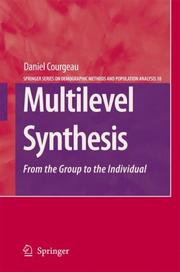
ISBN: 128086494X 9786610864942 1402056222 1402056214 9048174104 Year: 2007 Volume: v. 18 Publisher: Dordrecht ; [London] : Springer,
Abstract | Keywords | Export | Availability | Bookmark
 Loading...
Loading...Choose an application
- Reference Manager
- EndNote
- RefWorks (Direct export to RefWorks)
This book presents a historical panorama of the evolution of demographic thought from its eighteenth-century origins up to the present day, and uses it to demonstrate how the multilevel approach can resolve some of the contradictions that have become apparent and achieve a synthesis of the different approaches employed. Part one guides the reader from period analysis to multilevel analysis, examining longitudinal and event history analysis on the way. Part two is a detailed account of multilevel analysis, its methods, and the relevant mathematical models notably as regards the type of variables being used. Numerous examples, examined across successive sections, make the book clear and easy to follow. The theoretical and epistemological treatment of these problems, during which the foundations of sociology and demography are revisited, and the logical development that leads to the most recent approaches, are handled sufficiently rigorously to satisfy social science specialists while remaining accessible for readers new to the field. The whole adds up to a comprehensive account of progress in sociological and demographic savoir-faire, as well as being both a textbook and an assessment of the multilevel analysis that tackles one of the major problems of empirical sociology: that of integrating analysis at the individual and group levels.
Demography --- Multilevel models (Statistics) --- Methodology. --- Hierarchical linear models (Statistics) --- Mixed effects models (Statistics) --- Random coefficient models (Statistics) --- Variance component models (Statistics) --- Mathematical models --- Regression analysis --- Demography. --- Social sciences --- Genetic epistemology. --- History. --- Statistics. --- Methodology of the Social Sciences. --- Epistemology. --- History of Science. --- Statistics for Social Sciences, Humanities, Law. --- Statistical analysis --- Statistical data --- Statistical methods --- Statistical science --- Mathematics --- Econometrics --- Annals --- Auxiliary sciences of history --- Developmental psychology --- Knowledge, Theory of --- Historical demography --- Population --- Vital statistics --- Social sciences. --- Statistics . --- Epistemology --- Theory of knowledge --- Philosophy --- Psychology --- Behavioral sciences --- Human sciences --- Sciences, Social --- Social science --- Social studies --- Civilization
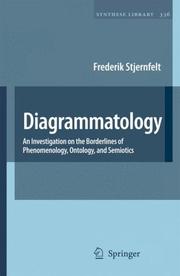
ISBN: 1280944021 9786610944026 1402056524 1402056516 940070531X Year: 2007 Volume: v. 336 Publisher: Dordrecht ; London : Springer,
Abstract | Keywords | Export | Availability | Bookmark
 Loading...
Loading...Choose an application
- Reference Manager
- EndNote
- RefWorks (Direct export to RefWorks)
Diagrammatology investigates the role of diagrams for thought and knowledge. Based on the general doctrine of diagrams in Charles Peirce's mature work, Diagrammatology claims diagrams to constitute a centerpiece of epistemology. The book reflects Peirce's work on the issue in Husserl's contemporanous doctrine of "categorial intuition" and charts the many unnoticed similarities between Peircean semiotics and early Husserlian phenomenology. Diagrams, on a Peircean account, allow for observation and experimentation with ideal structures and objects and thus furnish the access to the synthetic a priori of the regional and formal ontology of the Husserlian tradition. The second part of the book focusses on three regional branches of semiotics: biosemiotics, picture analysis, and the theory of literature. Based on diagrammatology, these domains appear as accessible for a diagrammatological approach which leaves the traditional relativism and culturalism of semiotics behind and hence constitutes a realist semiotics Diagrams will never be the same. A fascinating and challenging tour through phenomenology, biology, Peirce's theory of signs and Ingarden's ontology of literature, all neatly tied together through the guiding thread of the diagrammatical. A veritable tour de force. Barry Smith, SUNY at Buffalo, U.S.A. With his meticulous scholarship, Frederik Stjernfelt shows that Peirce and Husserl were cultivating a broad and fertile common ground, which was largely neglected by both the analytic and the continental philosophers during the 20th century and which promises to be an exciting area of research in the 21st. John F. Sowa, Croton-on-Hudson, U.S.A.
Iconicity (Linguistics) --- Knowledge, Theory of. --- Logic diagrams. --- Ontology. --- Phenomenology. --- Semiotics. --- Philosophy, Modern --- Being --- Philosophy --- Metaphysics --- Necessity (Philosophy) --- Substance (Philosophy) --- Semeiotics --- Semiology (Linguistics) --- Semantics --- Signs and symbols --- Structuralism (Literary analysis) --- Diagrams, Logic --- Logic --- Epistemology --- Theory of knowledge --- Psychology --- Iconism (Linguistics) --- Icons (Linguistics) --- Linguistics --- Semiotics --- Diagrams --- Graphic methods --- Genetic epistemology. --- Pragmatism. --- Phenomenology . --- Comparative literature. --- Biology-Philosophy. --- Epistemology. --- Comparative Literature. --- Philosophy of Biology. --- Biology --- Philosophy. --- Comparative literature --- Literature, Comparative --- Philology --- Idealism --- Knowledge, Theory of --- Positivism --- Realism --- Utilitarianism --- Experience --- Reality --- Truth --- Developmental psychology --- Vitalism --- History and criticism --- Biology—Philosophy.
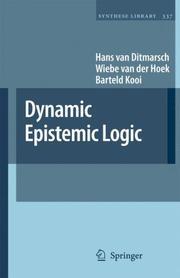
ISBN: 128086527X 9786610865277 140205839X 1402058381 1402069081 1281134163 Year: 2007 Volume: v. 337 Publisher: Dordrecht, Netherlands : Springer,
Abstract | Keywords | Export | Availability | Bookmark
 Loading...
Loading...Choose an application
- Reference Manager
- EndNote
- RefWorks (Direct export to RefWorks)
Dynamic Epistemic Logic is the logic of knowledge change. This is not about one logical system, but about a whole family of logics that allows us to specify static and dynamic aspects of multi-agent systems. This book provides various logics to support such formal specifications, including proof systems. Concrete examples and epistemic puzzles enliven the exposition. The book also contains exercises including answers and is eminently suitable for graduate courses in logic. A sweeping chapter-wise outline of the content of this book is the following. The chapter 'Introduction' informs the reader about the history of the subject, and its relation to other disciplines. 'Epistemic Logic' is an overview of multi-agent epistemic logic - the logic of knowledge - including modal operators for groups, such as general and common knowledge. 'Belief Revision' is an overview on how to model belief revision, both in the 'traditional' way and in a dynamic epistemic setting. 'Public Announcements' is a detailed and comprehensive introduction into the logic of knowledge to which dynamic operators for truthful public announcement are added. Many interesting applications are also presented in this chapter: a form of cryptography for ideal agents also known as 'the russian cards problem', the sum-and-product riddle, etc. 'Epistemic Actions' introduces a generalization of public announcement logic to more complex epistemic actions. A different perspective on that matter is independently presented in 'Action Models'. 'Completeness' gives details on the completeness proof for the logics introduced in 'Epistemic Logic', 'Public Announcements', and 'Action Models'. 'Expressivity' discusses various results on the expressive power of the logics presented. "I am very glad to see that three people so active in this area of knowledge update are bringing out this book. It should be of great help to graduate students as well as established researchers." Rohit Parikh, Distinguished Professor, City University of New York.
Logic. --- Epistemics. --- Argumentation --- Deduction (Logic) --- Deductive logic --- Dialectic (Logic) --- Logic, Deductive --- Intellect --- Philosophy --- Psychology --- Science --- Reasoning --- Thought and thinking --- Methodology --- General semantics --- Knowledge, Theory of --- Artificial intelligence. --- Genetic epistemology. --- Computer science. --- Artificial Intelligence. --- Epistemology. --- Mathematical Logic and Formal Languages. --- Informatics --- Developmental psychology --- AI (Artificial intelligence) --- Artificial thinking --- Electronic brains --- Intellectronics --- Intelligence, Artificial --- Intelligent machines --- Machine intelligence --- Thinking, Artificial --- Bionics --- Cognitive science --- Digital computer simulation --- Electronic data processing --- Logic machines --- Machine theory --- Self-organizing systems --- Simulation methods --- Fifth generation computers --- Neural computers --- Mathematical logic. --- Algebra of logic --- Logic, Universal --- Mathematical logic --- Symbolic and mathematical logic --- Symbolic logic --- Mathematics --- Algebra, Abstract --- Metamathematics --- Set theory --- Syllogism --- Epistemology --- Theory of knowledge
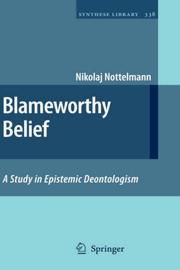
ISBN: 1280959916 9786610959914 1402059612 1402059604 9048174899 Year: 2007 Publisher: Dordrecht : Springer,
Abstract | Keywords | Export | Availability | Bookmark
 Loading...
Loading...Choose an application
- Reference Manager
- EndNote
- RefWorks (Direct export to RefWorks)
Believing the wrong thing may sometimes have drastic consequences. The question as to when a person is not only ill-guided, but genuinely at fault for holding a particular belief is an important one: It touches upon the roots of our understanding of such notions as criminal negligence and moral responsibility. The answer to this question may influence the extent to which we are willing to submit each other to punishments ranging from mild resentment to harsh prison terms. This book presents an extensive effort to shed light on the conditions under which we may appropriately deem someone blameworthy for holding a particular belief. It regiments and unifies several debates within contemporary epistemology, ethics and legal scholarship. Finally, the book brings a new philosophical look on issues like our power to control beliefs and the extent and nature of foresight. "Blameworthy Belief is unique in being an up-to-date monograph devoted entirely to the problem of a moral appraisal of beliefs and the closely related problem of deciding to believe (doxastic voluntarism and anti-voluntarism). It is bound to become a highly influential work and is of great interest not only to epistemologists, but also to philosophers of law and moral philosophers." Heinrich Wansing, Professor of Philosophy of Science and Logic, Dresden University of Technology, Germany "Nottelmann has nicely managed to weave accounts of competing views into his discussion, and so this book provides an excellent survey of the literature en route to the development of a sensible account of how we could be said to be responsible for believing various things, even though belief formation is not under our voluntary control." John Heil, Professor of Philosophy, Washington University in St. Louis, U.S.A., and Monash University, Australia.
Knowledge, Theory of. --- Ethics. --- Deontology --- Ethics, Primitive --- Ethology --- Moral philosophy --- Morality --- Morals --- Philosophy, Moral --- Science, Moral --- Philosophy --- Values --- Epistemology --- Theory of knowledge --- Psychology --- Genetic epistemology. --- Philosophy of law. --- Philosophy of mind. --- Education --- Philosophy (General). --- Epistemology. --- Philosophy of Law. --- Philosophy of Mind. --- Philosophy of Education. --- Philosophy, general. --- Philosophy. --- Mind, Philosophy of --- Mind, Theory of --- Theory of mind --- Cognitive science --- Metaphysics --- Philosophical anthropology --- Developmental psychology --- Knowledge, Theory of --- Political science. --- Philosophy and social sciences. --- Mental philosophy --- Humanities --- Social sciences and philosophy --- Social sciences --- Administration --- Civil government --- Commonwealth, The --- Government --- Political theory --- Political thought --- Politics --- Science, Political --- State, The
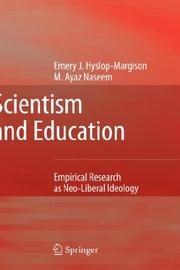
ISBN: 1281117420 9786611117429 1402066783 1402066775 9048176972 Year: 2007 Publisher: [Dordrecht] : Springer,
Abstract | Keywords | Export | Availability | Bookmark
 Loading...
Loading...Choose an application
- Reference Manager
- EndNote
- RefWorks (Direct export to RefWorks)
This volume offers a critical examination of the growing pressure to apply scientific principles as a means to improve education. The authors trace the ideology of scientism to the early faith Auguste Comte placed in science and the scientific method as a panacea to all human problem solving. By revealing many of the epistemological problems confronted by the social sciences, including education, the authors undermine the prevailing view that a science of education is possible or desirable. Besides revealing the epistemological problems associated with education research, they suggest that the instrumentalism and micro level responsibility related to scientism in education constitute a manipulative ideological smokescreen to distract public attention away from the structural inequities that generate disparate academic outcomes among students in industrialized democracies. The book deals a severe blow to the belief that science is a suitable lens through which to view or strengthen educational practice. "One begins this book with the skeptical belief that it can’t be right. The task of reading, then, is to locate where Hyslop-Margison goes wrong to reach his radical and disturbing conclusions. At the very least, even the most skeptical will have to recognize that the unsayable—that current educational research has proven largely fruitless for discernable reasons—is certainly plausible. He brilliantly brings an issue that has been considered too eccentric to contemplate into the heart of current educational discourse. Everyone concerned with educational research—researchers and those policy-makers, administrators, and other educational workers who draw on the products of educational research should read this important book carefully." Kieran Egan, Faculty of Education, Simon Fraser University.
Education --- Scientism. --- Research --- Methodology. --- Knowledge, Theory of --- Science --- Methodology --- Social sciences --- Genetic epistemology. --- Administration, Organization and Leadership. --- Educational Policy and Politics. --- Educational Philosophy. --- Philosophy of the Social Sciences. --- Epistemology. --- Philosophy. --- Developmental psychology --- Social philosophy --- Social theory --- School management and organization. --- School administration. --- Educational policy. --- Education and state. --- Education—Philosophy. --- Philosophy and social sciences. --- Education policy --- Educational policy --- State and education --- Social policy --- Endowment of research --- Administration, Educational --- Educational administration --- Inspection of schools --- Operation policies, School --- Policies, School operation --- School administration --- School inspection --- School operation policies --- School organization --- Schools --- Management --- Organization --- Epistemology --- Theory of knowledge --- Philosophy --- Psychology --- Social sciences and philosophy --- Government policy --- Inspection --- Management and organization
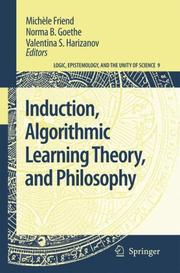
ISBN: 1281044814 9786611044817 1402061277 1402061269 9048175445 Year: 2007 Publisher: Dordrecht : Springer,
Abstract | Keywords | Export | Availability | Bookmark
 Loading...
Loading...Choose an application
- Reference Manager
- EndNote
- RefWorks (Direct export to RefWorks)
This is the first book to collect essays from philosophers, mathematicians and computer scientists working at the exciting interface of algorithmic learning theory and the epistemology of science and inductive inference. Readable, introductory essays provide engaging surveys of different, complementary, and mutually inspiring approaches to the topic, both from a philosophical and a mathematical viewpoint. Building upon this base, subsequent papers present novel extensions of algorithmic learning theory as well as bold, new applications to traditional issues in epistemology and the philosophy of science. The volume is vital reading for students and researchers seeking a fresh, truth-directed approach to the philosophy of science and induction, epistemology, logic, and statistics.
Computer algorithms. --- Machine learning. --- Mathematics --- Philosophy. --- Logic of mathematics --- Mathematics, Logic of --- Learning, Machine --- Artificial intelligence --- Machine theory --- Algorithms --- Genetic epistemology. --- Logic, Symbolic and mathematical. --- Computer science. --- Science --- Algorithms. --- Consciousness. --- Epistemology. --- Mathematical Logic and Foundations. --- Mathematical Logic and Formal Languages. --- Philosophy of Science. --- Cognitive Psychology. --- Algebra of logic --- Logic, Universal --- Mathematical logic --- Symbolic and mathematical logic --- Symbolic logic --- Algebra, Abstract --- Metamathematics --- Set theory --- Syllogism --- Developmental psychology --- Knowledge, Theory of --- Apperception --- Mind and body --- Perception --- Philosophy --- Psychology --- Spirit --- Self --- Algorism --- Algebra --- Arithmetic --- Normal science --- Philosophy of science --- Informatics --- Foundations --- Mathematical logic. --- Philosophy and science. --- Cognitive psychology. --- Epistemology --- Theory of knowledge --- Psychology, Cognitive --- Cognitive science --- Science and philosophy --- Knowledge, Theory of. --- Machine theory. --- Formal Languages and Automata Theory. --- Abstract automata --- Abstract machines --- Automata --- Mathematical machine theory --- Logic, Symbolic and mathematical --- Recursive functions --- Robotics
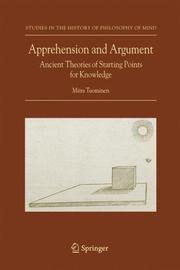
ISBN: 9781402050435 1402050429 9781402050428 1402050437 1280804688 9786610804689 9048172632 Year: 2007 Volume: 3 Publisher: Dordrecht : Springer,
Abstract | Keywords | Export | Availability | Bookmark
 Loading...
Loading...Choose an application
- Reference Manager
- EndNote
- RefWorks (Direct export to RefWorks)
If we know something, do we always know it through something else? Does this mean that the chain of knowledge should continue infinitely? Or, rather, should we abandon this approach and ask how we acquire knowledge? Irrespective of the fact that very basic questions concerning human knowledge have been formulated in various ways in different historical and philosophical contexts, philosophers have been surprisingly unanimous concerning the point that structures of knowledge should not be infinite. In order for there to be knowledge, there must be at least some primary elements which may be called ‘starting points’. This book offers the first synoptic study of how the primary elements in knowledge structures were analysed in antiquity from Plato to late ancient commentaries, the main emphasis being on the Platonic-Aristotelian tradition. It argues that, in the Platonic-Aristotelian tradition, the question of starting points was treated from two distinct points of view: from the first perspective, as a question of how we acquire basic knowledge; and from the second perspective, as a question of the premises we may immediately accept in the line of argumentation. It was assumed that we acquire some general truths rather naturally and that these function as starting points for inquiry. In the Hellenistic period, an alternative approach was endorsed: the very possibility of knowledge became a central issue when sceptics began demanding that true claims should always be distinguishable from false ones.
kennisleer --- History of philosophy --- Theory of knowledge --- filosofie --- epistomologie --- persoonlijkheidsleer --- geschiedenis --- Philosophy of science --- epistemologists --- Philosophy --- Psychology --- Antiquity --- Knowledge, Theory of. --- Philosophy, Ancient. --- Ancient philosophy --- Greek philosophy --- Philosophy, Greek --- Philosophy, Roman --- Roman philosophy --- Epistemology --- Théorie de la connaissance --- Philosophie ancienne --- EPUB-LIV-FT LIVPHILO SPRINGER-B --- Philosophy, classical. --- Philosophy (General). --- Genetic epistemology. --- Philosophy of mind. --- Science --- Classical Philosophy. --- Cultural Studies. --- History of Philosophy. --- Epistemology. --- Philosophy of Mind. --- Philosophy of Science. --- Philosophy. --- Normal science --- Mind, Philosophy of --- Mind, Theory of --- Theory of mind --- Cognitive science --- Metaphysics --- Philosophical anthropology --- Developmental psychology --- Knowledge, Theory of --- Philosophy, Ancient --- Cultural studies. --- Philosophy and science. --- Mental philosophy --- Humanities --- Science and philosophy --- Culture --- Ancient Philosophy / Classical Philosophy. --- Study and teaching. --- History. --- Cultural studies
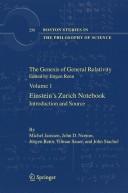

ISBN: 9781402040009 1402039999 9781402039997 1402040008 1281069728 9786611069728 940178518X Year: 2007 Volume: 250 Publisher: Dordrecht Springer
Abstract | Keywords | Export | Availability | Bookmark
 Loading...
Loading...Choose an application
- Reference Manager
- EndNote
- RefWorks (Direct export to RefWorks)
This four-volume work represents the most comprehensive documentation and study of the creation of general relativity; one of the fundamental physical theories of the 20th century. It comprises key sources from Einstein and others who from the late 19th to the early 20th century contributed to this monumental development. Some of these sources are presented here in translation for the first time. Einstein’s famous Zurich notebook, which documents the pivotal steps toward general relativity, is reproduced here for the first time and transcribed in its entirety. The volumes offer detailed commentaries and analyses of these sources that are based on a close reading of these documents supplemented by interpretations by the leading historians of relativity. All in all, the facets of this work, based on more than a decade of research, combine to constitute one of the most in-depth studies of a scientific revolution ever written.
kennisleer --- Pure sciences. Natural sciences (general) --- Theory of knowledge --- filosofie --- epistomologie --- Philosophy of nature --- Philosophy of science --- wetenschapsgeschiedenis --- epistemologists --- Philosophy --- General relativity (Physics) --- Relativity (Physics) --- Gravitation --- Nonrelativistic quantum mechanics --- Space and time --- Relativistic theory of gravitation --- Relativity theory, General --- Physics --- Einstein, Albert --- Einstein, Albert, --- General relativity (Physics). --- Relativity (Physics). --- Philosophy (General). --- History. --- Genetic epistemology. --- Philosophy of nature. --- Science --- Classical and Quantum Gravitation, Relativity Theory. --- Philosophy, general. --- History of Science. --- Epistemology. --- Philosophy of Nature. --- Philosophy of Science. --- Philosophy. --- Normal science --- Nature --- Nature, Philosophy of --- Natural theology --- Developmental psychology --- Knowledge, Theory of --- Annals --- Auxiliary sciences of history --- Gravitation. --- Philosophy and science. --- Science and philosophy --- Epistemology --- Psychology --- Mental philosophy --- Humanities --- Field theory (Physics) --- Matter --- Antigravity --- Centrifugal force --- Properties --- Aiyinsitan, Abote, --- Aĭnshtaĭn, Albert, --- Ainshutain, A, --- Ain̲sṭain̲, Ālparṭ, --- Ainsṭāina, Albarṭa, --- Ajnštajn, Albert, --- Āynishtayn, --- Aynshtayn, Albert, --- Eĭnshteĭn, Alʹbert, --- אינשטין, אלברט, --- איינשטיין --- איינשטיין, אלבערט, --- איינשטיין, אלברט --- איינשטיין, אלברט, --- Aynştayn, Elbêrt, --- Īnshtīn, --- Aynîştayn, --- Aiyinsitan, --- 愛因斯坦, --- 爱因斯坦,
| Listing 1 - 10 of 10 |
Sort by
|

 Search
Search Feedback
Feedback About UniCat
About UniCat  Help
Help News
News